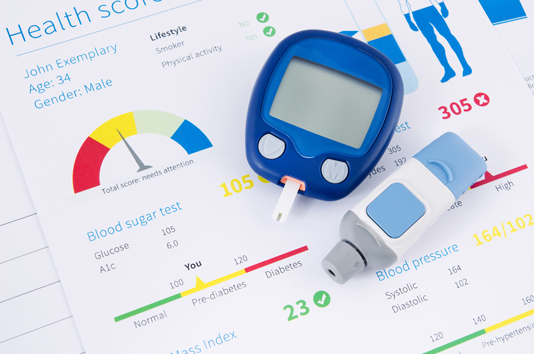American Diabetes Month: Are You at Risk of Developing Diabetes?
By Nick Nicholson, MD
Diabetes is a serious health concern that affects nearly 30 million Americans. It is the seventh-leading cause of death in the United States. November is American Diabetes Month, a month set aside to raise awareness about the disease and its prevention.
What is diabetes?
Diabetes is a group of diseases resulting in too much sugar in the blood (blood glucose). When we eat, our bodies turn food into glucose, or sugar, and is processed by the body as energy. The pancreas creates a hormone called insulin, which helps the body regulate blood sugar levels and break down the sugars and starches consumed into glucose. Diabetes is diagnosed when the pancreas either does not produce enough insulin (or any at all), or becomes ineffective at using insulin that is produced.
There are three main forms of the disease: gestational, type 1 and type 2 diabetes. Gestational diabetes is triggered at pregnancy. Type 1 diabetes is a chronic condition in which the pancreas produces little or no insulin and is typically diagnosed in childhood or early adulthood. Type 2 diabetes is a weight-related health concern that develops when the body becomes insulin resistant. This means the body either does not produce enough insulin or the body does not properly use what insulin is produced.
When the body does not produce or make proper use of insulin, glucose builds up in the bloodstream, which can cause other health complications such as skin disorders, nerve damage (neuropathy), and eye problems like glaucoma, cataracts and diabetic retinopathy. It also increases risk of high blood pressure, stroke and heart disease.
Are You at Risk of Developing Diabetes?
Type 1 diabetes is a chronic condition that cannot be prevented, however, complications from the disease can be managed by keeping blood sugar levels in check. Type 2 diabetes can be prevented and even reversed.
Weight is the single best predictor for type 2 diabetes — almost 90 percent of people living with type 2 diabetes are overweight or have obesity — but there others factors that may increase your risk, such as: age, race, pregnancy, stress, certain medications, genetics or family history and high cholesterol.
Since the 1990s, rates of diabetes have increased by one-third, in direct correlation to the rapid increase in the prevalence of obesity in the United States. Type 2 diabetes can be prevented by watching your weight, eating a healthy diet and staying physically active.
To find out if you are at risk of developing type 2 diabetes, take this risk assessment from the American Diabetes Association.
How Can Weight Loss Help?
Type 2 diabetes may be preventable with lifestyle changes, such as weight management, regular exercise and a healthy diet. Studies have found that losing five to 10 percent of body weight can prevent or delay the development of type 2 diabetes in adults who are high risk for the disease. Researchers have also found that weight loss surgery may deliver a more lasting method for the prevention of type 2 diabetes.
Recent research indicates that weight loss surgery can have a profound effect on diabetes symptoms in obese patients who undergo procedures to help them shed excess weight. In some cases, bariatric surgery can help reduce or eliminate a diabetic patient’s need for diabetes medications to control blood sugar.
Maintaining a healthy weight is vital for diabetics who wish to gain an upper hand on the disease and its potential side effects. By losing weight and adopting a healthier lifestyle, diabetics can lower their risk for a host of complications related to the disease. Surgical intervention can make a big difference for those deemed obese or morbidly obese. Both the American Diabetes Association and the International Diabetes Federation recognize bariatric surgery as a viable treatment for diabetes in patients who are obese.
If you’re dealing with diabetes or any other weight-related condition, contact Nicholson Clinic today to discuss your candidacy for bariatric surgery. By taking the steps to lose weight and live a healthier lifestyle, you can potentially eliminate a variety of life-changing and even life-threatening conditions.
About the Author
One of the most experienced weight loss surgeons in the country — Dr. Nick Nicholson — along with a full staff of surgeons, nurses and other experienced clinicians, help patients reverse obesity with LAP-BAND, Gastric Bypass, Sleeve Gastrectomy, Gastric Balloon and Revisions.


